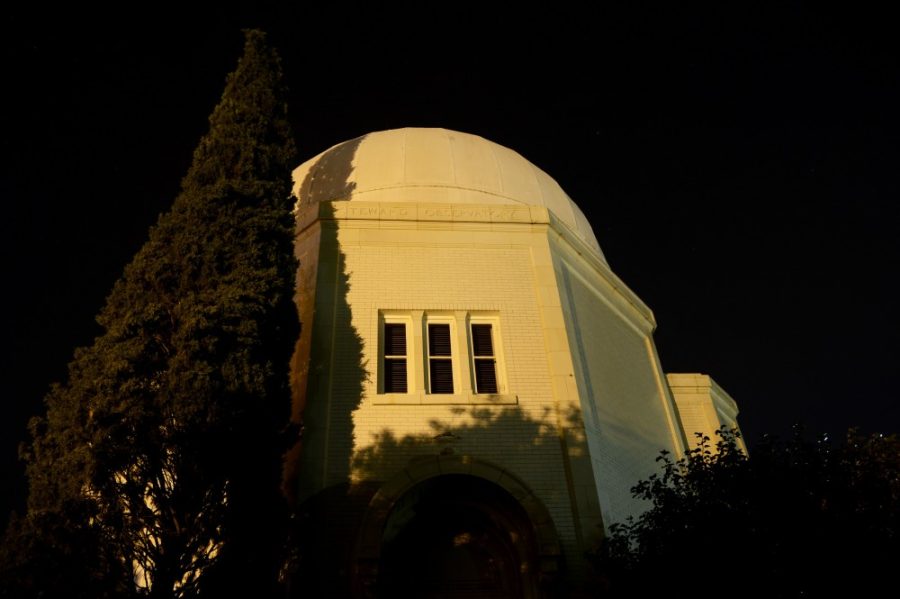From film to scientific studies and languages to paintings, the Confluencenter for Creative Inquiry promotes interdisciplinary research and collaboration in order to address serious issues in today’s society.
Formed in 2010, the Confluencenter has thus far given out more than $2.2 million in funding and supported around 250 projects, including the documentary “Focusing the Universe,” a short history of the Steward Observatory created by Michael Mulcahy, associate professor of theatre, film and television, and Peter Beudert, distinguished professor.
Mulcahy said the idea for the film came from the pair’s shared interest in history. They reached out to the Confluencenter because they got funding for a separate film from the center a few years ago and because Beudert was a founding member.
“The film was what the Confluencenter had always been excited about,” Mulcahy said. “Now you had one unit, Peter and me, reaching out across colleges. Even though Peter and I are in the same school, he’s theater and I’m film, so that’s bridging a gap.”
That connection is what the Confluencenter aims to facilitate. Their mission is to support interdisciplinary collaborations, foster research and creative activity and allow faculty to make connections across colleges.
Mulcahy said the center truly promotes creative synthesis and work “in big and small ways to bring people together.”
“They’re more than just giving out money,” Mulcahy said. “They’re trying to stimulate an environment in which people can meet each other to see what comes of it, because faculty members can get stuck in their own discipline. I would certainly want to work with the Confluencenter again.”
RELATED: Steward Observatory celebrates 100 years since its founding gift
“Focusing the Universe” will be shown on KUAT-TV in the spring. Mulcahy said it might be picked up by other member affiliate stations as well.
That hits another important aspect of the Confluencenter’s mission—community engagement.
Confluencenter Director Javier Duran said products like film, art exhibits and concerts all help engage the public, because they fall outside of what’s typically considered research.
“We feel that fine arts are often left out of research,” Duran said. “We provide equal space. This is the challenge, because all the work is equally important.”
Equality is a central idea at the Confluencenter, which Duran said is “recognized as a center that promotes diversity and inclusion on many levels.”
“Our researchers are poets, scientists, artists, psychologists,” Duran said. “We use creative inquiry as an umbrella to create that intellectual space for people trying to reach out of their discipline.”
Funding for the Confluencenter comes mostly in the form of state money from the Office of the Provost, though there are some private donations as well.
The Confluencenter also focuses on co-sponsorships and partnerships, especially those reaching the community.
“Many people don’t come to campus that much,” Duran said. “Community engagement is an important part of our mission. So, if them coming here is a challenge, why not just go to them?”
To that end, the Confluencenter has worked with the City of Tucson, the Mexican Consulate, the Loft Cinema and Playground Bar and Lounge, along with many different colleges and groups on campus.
RELATED: Steward Observatory celebrates 100 years of establishment
Jamie Manser, Confluencenter communications and events coordinator, said they host a monthly “Show and Tell” at Playground, where attendance has grown with each session.
“The show-and-tells are chosen by which researchers have the time and ability to report and have things to talk about, like a project near completion,” Manser said. “All of the outcomes are more than what just one researcher could come up with.”
Mulcahy agreed, saying the best part of the process was the collaboration.
“I don’t normally have enough money to collaborate with people all the time,” Mulcahy said. “It’s nice when you’re not the only one shouldering all the weight. [Beudert] and I could go back and forth on an idea and make it stronger. It was really very enjoyable.”
Duran pointed to those feelings to showcase how well the Confluencenter has been received. He said the Confluencenter will go under its yearly review soon, and he’s sure the outcome will be positive.
“We’re new,” Duran said. “We don’t have alumni. It takes time to build things, but we’ve got a wide range of possibilities. To sustain this, it’s going to be a mix. We’re going to have to seek large grants and it’s clear we’re also going to need some philanthropy.”
The Confluencenter’s 2015-2016 annual report showed they gave out $815,263 in seed money and saw a six-to-one return on their investment, as their researchers were awarded $5 million in external investments.
Duran stressed that money isn’t the center’s focus.
“It’s not all about money,” Duran said. “Sometimes we end up with a publication or a film, things that are really interesting, really informative and really cool.”
Follow Marissa Heffernan on Twitter.









